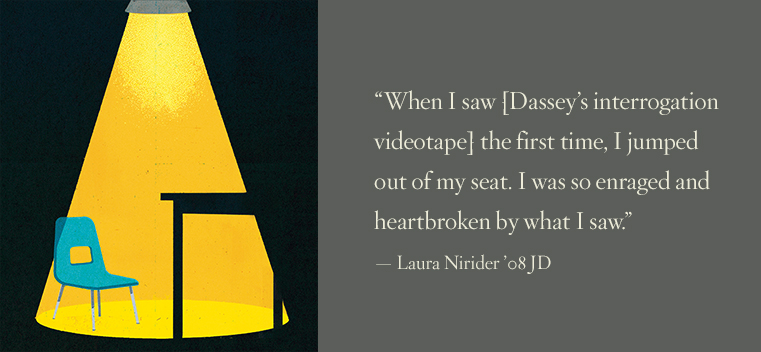
Un-Making A Murderer
Written by senior Jack Corrigan, with reporting by senior editor Sean Hargadon.
Learn more about the CWCY and the Dassey case in the Pritzker Northwestern School of Law’s Planet Lex podcast.
Tell us what you think. E-mail comments or questions to the editors at letters@northwestern.edu.
Find Us on Social Media
Law School team wins appeal on behalf of Brendan Dassey, the Wisconsin teen whose case came to light in Netflix documentary.
During law school at Northwestern in the late 2000s, Laura Nirider signed up for a clinical class on wrongful convictions. One day her professor, Steven Drizin, asked for a student to help him with an appeal. Nirider, who says she had neither experience nor interest in the criminal justice system before she took the class, “was the nearest student,” she jokes, “and that’s how I became involved in the case … that literally changed my life.”Eight years later, on Aug. 12, 2016, Drizin and Nirider finally won their appeal.
Drizin ’86 JD, a clinical professor of law and assistant dean of the Bluhm Legal Clinic, and Nirider ’08 JD worked on the case of Brendan Dassey, a Wisconsin man sentenced to life in prison at the age of 17 for being party to first-degree murder, second-degree sexual assault and mutilation of a corpse. His story recently gained national fame as part of the hit Netflix documentary series Making a Murderer.
The case was one of the first investigations by the Bluhm Legal Clinic’s Center on Wrongful Convictions of Youth, an organization co-founded by Drizin to represent children behind bars for crimes they did not commit. Because children are particularly vulnerable to legal pressures and less likely to understand their rights, wrongful convictions are disturbingly common.
Dassey’s case hinged on one of the biggest issues children face in the criminal justice system — false confessions. When questioning kids, interrogators often employ the same high-pressure psychological tactics they use on adults. The fact that Dassey suffers from a learning disability made him particularly susceptible to this type of manipulation.
“When I saw [Dassey’s interrogation videotape] the first time, I jumped out of my seat,” Nirider says. “I was so enraged and heartbroken by what I saw.”
In the video, she says two police interrogators spoon-fed Dassey his entire confession. A particularly heart-wrenching moment comes at the end when he asks the officers when he’ll get to return to school. The coerced confession eventually led to Dassey’s conviction in 2007.
“It’s that exact dynamic that the federal court picked up on in Brendan’s case — this notion that the interrogators were basically promising Brendan leniency so long as he said what they wanted him to say,” says Nirider. She also claims Dassey’s pretrial attorney, Len Kachinsky, cooperated with the prosecution, a drastic breach of his duty.
Dassey’s coerced confession and Kachinsky’s incompetent representation form the crux of the appeal. After two years of research, Nirider and Drizin argued at a post-conviction hearing that Dassey should be granted a new trial. The judge denied the motion. In 2013 the Wisconsin Court of Appeals refused to grant Dassey a new trial, and the Wisconsin Supreme Court refused to hear the case.
Eventually the team submitted a petition for a writ of habeas corpus in federal court. In August their petition was granted, giving Wisconsin 90 days to decide whether to release or retry Dassey. In mid-November a federal judge ordered Dassey's release from Columbia Correctional Institution in Portage, Wis., but a few days later the U.S. Court of Appeals for the Seventh Circuit agreed to an emergency motion filed by the Wisconsin Department of Justice to keep Dassey in jail until the appeal of his overturned conviction is settled.
Nirider now co-teaches the class that first brought her and Drizin together. She also serves as co-director of the Center on Wrongful Convictions of Youth, where she continues to represent Dassey and defend his rights in court. Still, she recognizes that her work can’t stop there.
“There are many more Brendan Dasseys in this country,” she says. “Not everyone is fortunate enough to have the issue brought to the world’s attention. In that way, I like to call Brendan the luckiest unlucky person I know.”
Recently she began working with the International Association of Chiefs of Police to change the way minors are interrogated by law enforcement. She wrote one of the only protocols for how to question kids in a way that prevents false confessions. The new guidelines recommend avoiding promises of leniency, fact-feeding and disclosing information about the crime. Most important, it advocates that minors have a parent or guardian present during questioning and the chance to consult an attorney. Dassey was afforded neither of those opportunities.
“A lot of folks are starting to care about false confessions,” she says. “Nobody wants the wrong person in prison.”



 Facebook
Facebook Twitter
Twitter Email
Email


